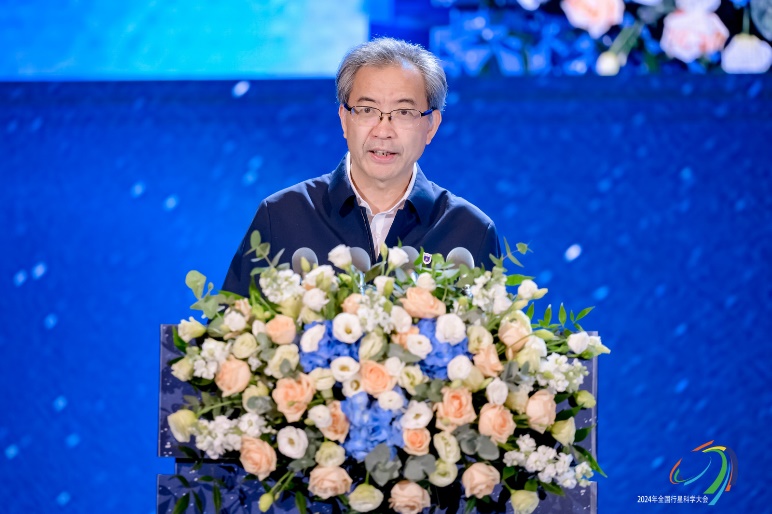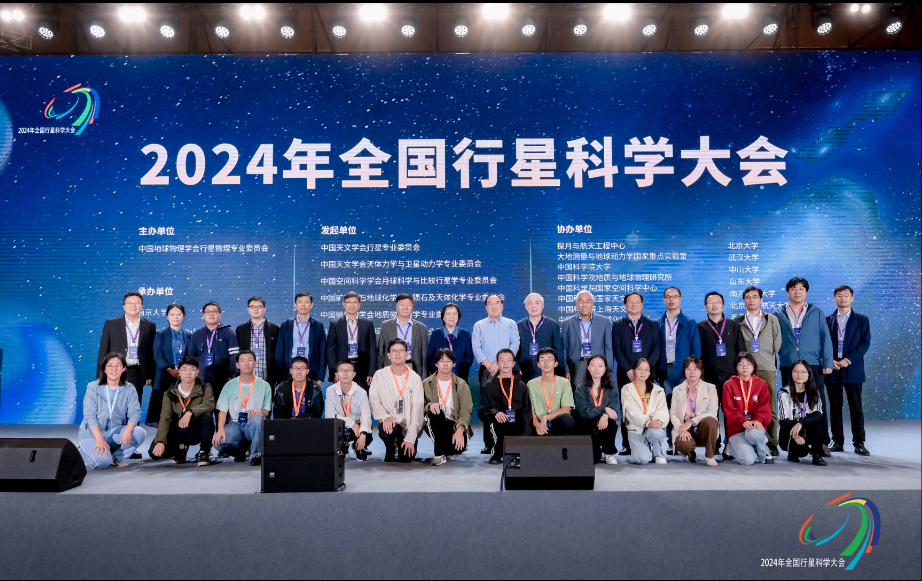From October 7 to 11, 2024, the National Planetary Science Conference was held in Nanjing. The event was organized by the Planetary Physics Committee of the Chinese Geophysical Society and co-hosted by Nanjing University and the Purple Mountain Observatory of the Chinese Academy of Sciences (CAS). The conference featured 39 sub-sessions and attracted more than 1,500 experts, scholars, and institutional representatives from across the country. Attendees from Nanjing University included President Tan Zhemin, an academician of CAS, along with CAS academicians Xu Zhiqin, Chen Jun, Shen Shuzhong, and Yang Jingsui, as well as Vice President Lu Xiancai, who is also Dean of the School of Earth Sciences and Engineering. As one of the co-hosts, Nanjing University collaborated with top talent in the field of planetary science in China to shape the future development of the discipline and fuel humanity's exploration of the universe.

Academician Tan Zhemin, President of Nanjing University
At the opening ceremony, CAS academician and President of the Chinese Geophysical Society, Di Qingyun, delivered a welcome speech on behalf of the organizers, highlighting the importance of the conference. CAS academician and Nanjing University President Tan Zhemin also gave a speech, expressing his hopes for the successful outcome of the event and reaffirming Nanjing University’s commitment to contributing to planetary science. He emphasized, “Disciplines closely related to planetary science, such as geology and astronomy, are traditional strengths of Nanjing University. We will continue to build on these strengths, fostering interdisciplinary collaboration to nurture more outstanding talent for the future of planetary science.” Zhao Changyin, Director of the Purple Mountain Observatory, spoke about the observatory's ongoing work in researching the surface of solar system bodies and its future involvement in planetary monitoring, early warning, defense, and space exploration missions of national importance. The opening ceremony was chaired by CAS academician Pan Yongxin from the Institute of Geology and Geophysics.
At the opening ceremony, Academician Wu Fuyuan from the Institute of Geology and Geophysics, CAS, presented a report on the study and future outlook of lunar samples from the Chang'e mission, showcasing related research achievements and directions. Academician Zhao Gang from the National Astronomical Observatories of CAS discussed exoplanets and extraterrestrial life. Academician Zhang Rongqiao from the Lunar Exploration and Space Engineering Center of the China National Space Administration elaborated on the development of China's planetary exploration and related reflections. Additionally, Professor Chen Ling from the Institute of Geology and Geophysics of CAS introduced evidence of long-term water activity on Mars, Professor Wang Yuming from the University of Science and Technology of China explained planetary magnetic fields and measurements, Professor Zhou Jilin from Nanjing University reported on exoplanet statistics and the search for habitable planets, and Professor Hu Yongyun from Peking University discussed exoplanet climates and habitability. The conference featured a wide range of academic discussions, including lunar and Martian geology, planetary remote sensing, planetary resources and in-situ utilization, and more. Each topic drew in-depth discussions from experts in their respective fields, allowing for rich exchanges of research findings.
Several specialized forums also drew attention, such as the "Planetary Science Education and Public Engagement" session, which discussed curriculum design and science education, and the "Planetary Science Professional Development and Talent Cultivation" forum, which focused on university-level education and postgraduate training. The "Women in Planetary Science Forum" featured speeches and messages from academicians, along with experience-sharing sessions by distinguished female scientists. Other forums covered subjects like the Tianwen-1 mission, the Apophis asteroid mission, and lunar research.
At the closing ceremony, Professor Cui Jun from Sun Yat-sen University, Director of the Planetary Physics Committee of the Chinese Geophysical Society, delivered a summary of the conference. Following that, several experts presented reports on key scientific issues related to the development of planetary science and provided insights into its future prospects. During the event, awards were also presented for outstanding student papers and to outstanding volunteer representatives.
Planetary science, an interdisciplinary field that integrates earth sciences, astronomy, space science, and engineering technology, is experiencing unprecedented growth, driven by national deep space exploration programs. Nanjing University, with its deep-rooted strengths in geology and astronomy, is promoting interdisciplinary collaboration and advancing planetary science. In 2021, the university established a research and education center in partnership with the Institute of Geology and Geophysics of CAS, and in 2023, it launched an undergraduate program in planetary science, laying a solid foundation for talent cultivation in this field.
Nanjing University remains committed to nurturing the next generation of planetary scientists, providing a platform for young scholars to explore their potential and contribute to deep space exploration. With this conference as a milestone, Nanjing University will continue to forge ahead in planetary science, aiming to make further contributions to humanity's exploration of the vast cosmos.

A group photo of some of the Nanjing University faculty and students attending the conference

